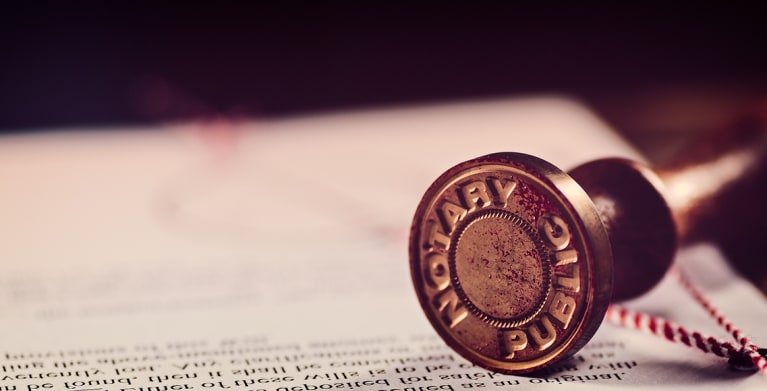Recognizing Apostille: Simplifying International Record Legalization
Wiki Article
Debunking Notarial Work: Simplifying the Role and Value of Notaries
In the intricate internet of lawful documents and confirmation, notaries stand as columns of guarantee and credibility. Their duty, typically shrouded in enigma for several, lugs substantial weight in making sure the credibility and stability of vital files. As guardians of legitimacy and fact, notaries play a crucial part in our society, yet their work is not constantly completely recognized. By unwinding the intricacies losing and surrounding notarial practices light on the value of their acts, a more clear understanding emerges of the important role notaries play in maintaining the material of legal and legal agreements.The Background of Notarial Work
Just how did notarial job advance over time to become an important part of legal and business purchases? The background of notarial job days back to old civilizations, where scribes played an essential function in videotaping crucial details and confirming records. As cultures progressed, the requirement for a more formalized system to make sure the credibility of agreements emerged. This resulted in the advancement of notaries, people selected by the state to function as impartial witnesses in lawful matters.
Throughout the Center Ages, notaries got importance in Europe, with their features expanding to include preparing legal files, licensing signatures, and preserving records. The increase of global trade additionally highlighted the importance of notarial operate in confirming agreements and agreements across borders.
In the modern-day period, notaries remain to play a crucial duty in legal and company purchases by confirming identities, validating the authenticity of documents, and stopping scams. Their duty in licensing the legitimacy of contracts includes a layer of safety and security and count on to the ever-evolving landscape of commerce and legislation.

Obligations and Obligations of Notaries
The historical development of notarial work from old people to the contemporary era has actually shaped the distinctive obligations and responsibilities that notaries maintain in lawful and organization transactions today. Notaries play a vital role in verifying the authenticity of documents and the identity of signatories. Among their primary responsibilities is to witness the finalizing of vital files, such as wills, contracts, and acts, to ensure that all celebrations are participating in agreements intentionally and voluntarily. Notaries likewise validate that signatures are of audio mind and not under discomfort or browbeating.Additionally, notaries are charged with administering affirmations and oaths, which are vital in legal procedures and the implementation of testimonies. They license copies of initial records, providing assurance to organizations that the copies are real replicas of the originals. Notaries need to keep exact documents of all purchases they look after to guarantee openness and responsibility. On the Get More Information whole, the tasks and obligations of notaries are vital in securing the integrity and validity of numerous records and transactions.
Notarial Certificates and Signatures
Exemplifying careful interest to information, notarial certificates and signatures work as essential elements in confirming the credibility of legal records. Notarial certificates commonly have vital info such as the date of notarization, the names of the notaries, a description of the document, and the notary's main seal. These certifications offer a clear document of the notarial act, making sure that the paper can be easily identified and traced back to the notary that looked after the process.Trademarks play a critical role in notarial work, as they symbolize the agreement and approval of the celebrations involved. Notaries meticulously witness the signing of records to confirm the identification of the signatures and validate that they are authorizing of their very own cost-free will. By attaching their main seal and signature to the record, notaries certify that the necessary procedures have actually been followed which the paper is enforceable and legitimate.
In significance, notarial certificates and trademarks are the characteristic of credibility in legal purchases, offering guarantee to all parties involved that the documents are legitimate and binding.
Importance of Notarial Acts

Registration Process Clarified
Explaining the registration process provides quality on the important actions involved in validating lawful records. The notarization process usually begins with the individual offering the paper to a notary public. The notary after that verifies the endorser's identity via acceptable recognition techniques. Once the identity is confirmed, the notary makes certain that the individual authorizing the file does so voluntarily and without any kind of browbeating.Conclusion

Notarial certifications commonly include essential information such as the date of notarization, the names of the notaries, a description of the paper, and the notary's official seal. These certifications offer a clear record of the notarial act, making certain that the file can be conveniently identified and mapped back to the notary that oversaw the procedure.
By fastening their official seal and trademark to the document, notaries license that the essential procedures have been followed and that the file is enforceable and valid.
By validating the identification of the signatures, verifying their willingness to enter right into the arrangement, and accrediting the day and location of the finalizing, notaries play an essential function in maintaining the legitimacy of legal records.After the file is authorized, the notary will certainly fasten their main seal or stamp onto the file.
Report this wiki page